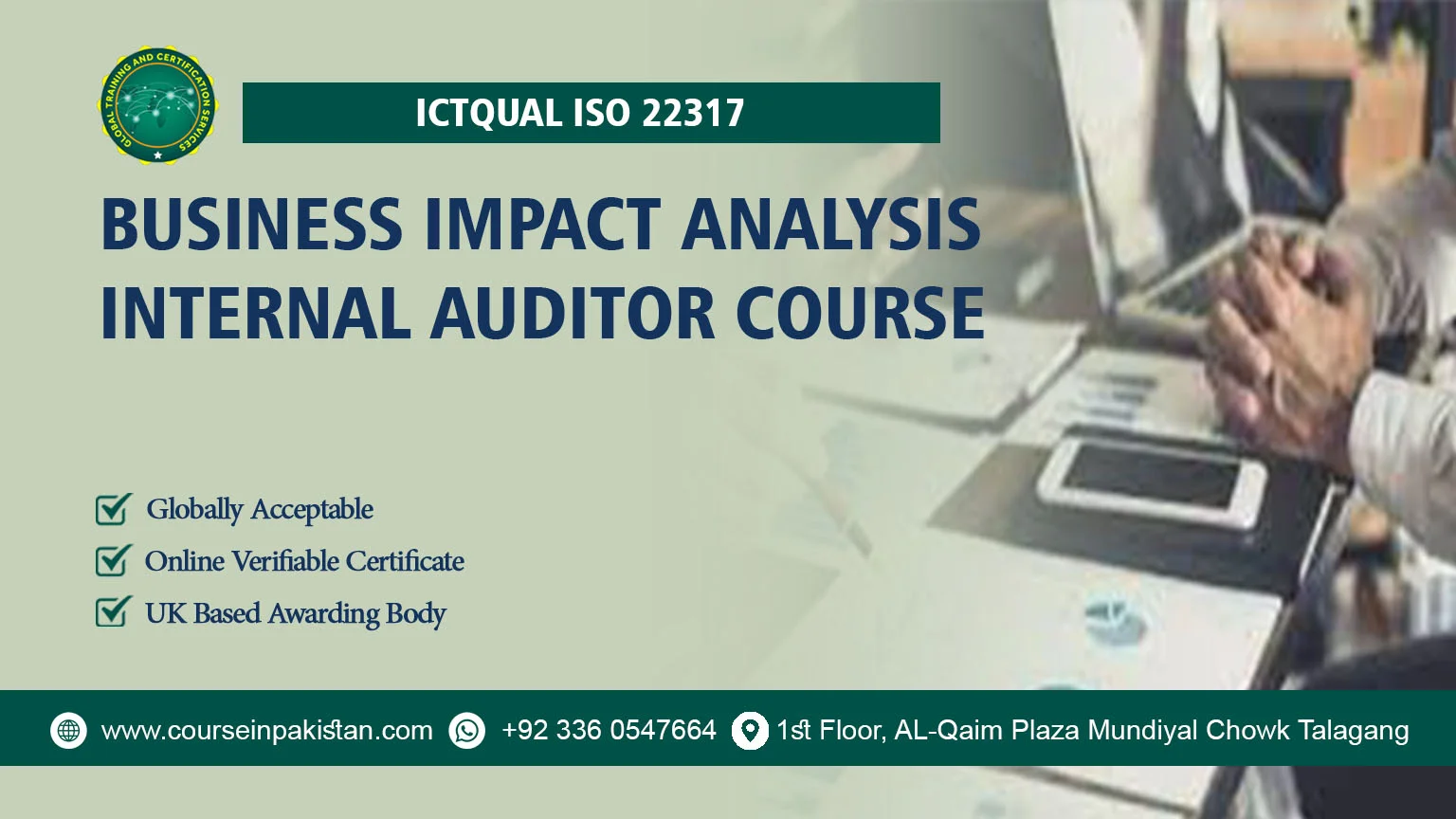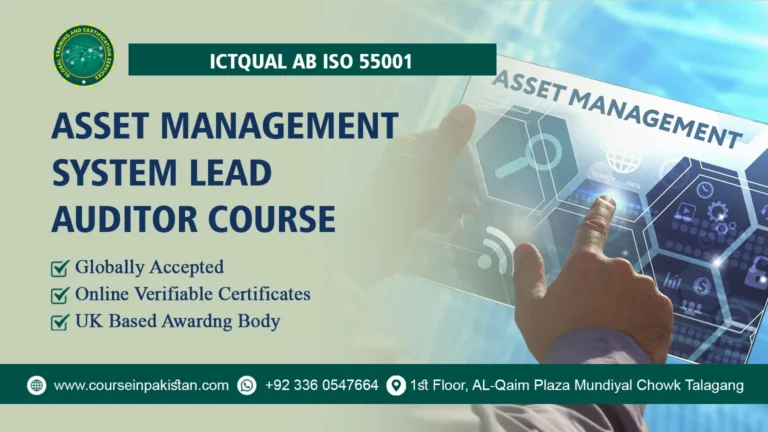
ICTQual ISO 22317 Business Impact Analysis Internal Auditor Course
In today’s dynamic business environment, organizations must be prepared to manage and mitigate the impact of disruptions effectively. The ISO 22317 Business Impact Analysis (BIA) Internal Auditor Course equips professionals with the knowledge and skills to conduct thorough BIAs, ensuring resilience and continuity in the face of adverse events.
Course Introduction
The ISO 22317 Business Impact Analysis Internal Auditor Course is designed to provide participants with a comprehensive understanding of business impact analysis principles, methodologies, and best practices as outlined in ISO 22317. Participants will learn how to assess the potential consequences of disruptions on critical business activities, prioritize recovery efforts, and develop robust continuity plans.
Course Overview
Throughout the course, participants will explore key aspects of business impact analysis, internal auditing principles, audit techniques, and methodologies specific to ISO 22317. Practical exercises and case studies will offer hands-on experience in conducting BIAs, documenting findings, and recommending strategies to enhance organizational resilience.
Course Benefits
- Expertise Development: Gain specialized knowledge in conducting BIAs to identify critical business functions, dependencies, and recovery priorities.
- Risk Mitigation: Understand how BIAs contribute to risk management by assessing the impact of disruptions and prioritizing continuity measures.
- Compliance Assurance: Align business impact analysis practices with ISO 22317 standards to ensure compliance and adherence to international best practices.
- Enhanced Organizational Resilience: Equip organizations with the ability to maintain essential functions and services during disruptions, minimizing operational downtime.
- Career Advancement: Expand career opportunities in business continuity management, risk assessment, and internal auditing roles focused on BIAs.
Course Study Units
The course typically covers essential topics such as:
- Introduction to Business Impact Analysis (BIA)
- Fundamentals of Internal Auditing
- ISO 22317 Requirements and Framework
- Business Impact Analysis Techniques
- Conducting BIA Audits
- Reporting and Follow-Up
- Continuous Improvement and Professional Development
Learning Outcomes
1. Introduction to Business Impact Analysis (BIA)
Learning Outcomes:
- Understand the purpose and importance of Business Impact Analysis (BIA) in identifying critical business functions, dependencies, and vulnerabilities.
- Recognize the role of BIA in assessing the potential consequences of disruptions on organizational operations, including financial, operational, and reputational impacts.
- Define key terms and concepts related to BIA, such as Maximum Tolerable Period of Disruption (MTPD) and Recovery Time Objective (RTO).
2. Fundamentals of Internal Auditing
Learning Outcomes:
- Describe the principles, objectives, and benefits of internal auditing within the context of Business Impact Analysis.
- Identify the responsibilities and competencies required of internal auditors when conducting BIA audits.
- Apply auditing principles to plan, execute, and report on BIA audits effectively and ethically.
3. ISO 22317 Requirements and Framework
Learning Outcomes:
- Gain a comprehensive understanding of the ISO 22317 standard and its framework for Business Impact Analysis.
- Interpret the guidelines and best practices provided by ISO 22317 for conducting BIAs and developing business continuity plans.
- Align organizational BIA practices with ISO 22317 standards to enhance resilience and continuity capabilities.
4. Business Impact Analysis Techniques
Learning Outcomes:
- Apply various techniques and methodologies for conducting Business Impact Analysis, such as surveys, interviews, and risk assessments.
- Analyze and prioritize critical business functions and processes based on their impact on organizational objectives and operations.
- Utilize scenario analysis and simulation exercises to assess the consequences of disruptions and evaluate recovery options.
5. Conducting BIA Audits
Learning Outcomes:
- Plan and prepare for BIA audits, including defining audit scope, objectives, and criteria based on ISO 22317 requirements.
- Conduct BIA audits systematically, collecting relevant data, evaluating findings, and verifying compliance with organizational policies and standards.
- Engage with stakeholders to gather input, validate assumptions, and ensure comprehensive coverage of critical business functions during audits.
6. Reporting and Follow-Up
Learning Outcomes:
- Prepare clear and concise audit reports that communicate BIA findings, conclusions, and recommendations for enhancing organizational resilience.
- Provide actionable insights and improvement opportunities based on audit results to support informed decision-making and risk mitigation strategies.
- Monitor and track the implementation of corrective actions and continuity measures to address identified vulnerabilities and strengthen organizational preparedness.
7. Continuous Improvement and Professional Development
Learning Outcomes:
- Implement continuous improvement practices in Business Impact Analysis to adapt to evolving organizational needs and emerging threats.
- Engage in professional development activities, such as training workshops and industry conferences, to stay updated on BIA best practices and standards.
- Foster a culture of resilience and proactive risk management within the organization through ongoing learning and knowledge sharing.
By mastering these learning outcomes across the study units of the ISO 22317 Business Impact Analysis Internal Auditor Course, participants will acquire the knowledge and skills necessary to effectively conduct BIAs, prioritize critical business functions, and develop robust continuity plans aligned with ISO 22317 standards. This expertise enables organizations to enhance their resilience against disruptions, safeguard critical operations, and maintain stakeholder confidence in challenging and unpredictable environments. The course is essential for professionals involved in business continuity management, internal auditing, or risk management roles, preparing them to lead and support BIA initiatives that strengthen organizational resilience and ensure continuity of essential business activities.
Who is This Course For?
This course is ideal for:
- Business Continuity Managers: Responsible for developing and implementing business continuity plans and strategies.
- Risk Managers: Involved in assessing and mitigating risks associated with business disruptions and continuity planning.
- Internal Auditors: Looking to specialize in auditing business impact analysis practices and continuity planning processes.
- Compliance Officers: Ensuring adherence to ISO 22317 standards and regulatory requirements related to business continuity.
Future Progression for This Course
Upon completing the ISO 22317 Business Impact Analysis Internal Auditor Course, participants can pursue further professional development and career advancement opportunities, such as:
- Certified Lead Auditor: Advance to become a certified lead auditor for ISO 22317, capable of leading audits for certification purposes.
- Advanced Business Continuity Training: Explore specialized courses in advanced business continuity planning, crisis management, or disaster recovery.
- Consultancy and Advisory Roles: Provide expert advice on business impact analysis and continuity planning strategies to organizations globally.
- Organizational Leadership: Take on leadership roles in business continuity management, driving strategic initiatives for enhancing organizational resilience and continuity capabilities.
ISO 22317 Business Impact Analysis Internal Auditor Course equips professionals with the knowledge and skills necessary to conduct effective BIAs, prioritize critical business functions, and develop robust continuity plans aligned with ISO 22317 standards. By mastering business impact analysis practices, participants contribute to ensuring organizations maintain essential operations during disruptions, safeguarding reputation, customer trust, and stakeholder confidence. This course is essential for anyone involved in business continuity management, internal auditing, or risk management roles, preparing them to address the complexities of business impact analysis and enhance organizational resilience effectively.






